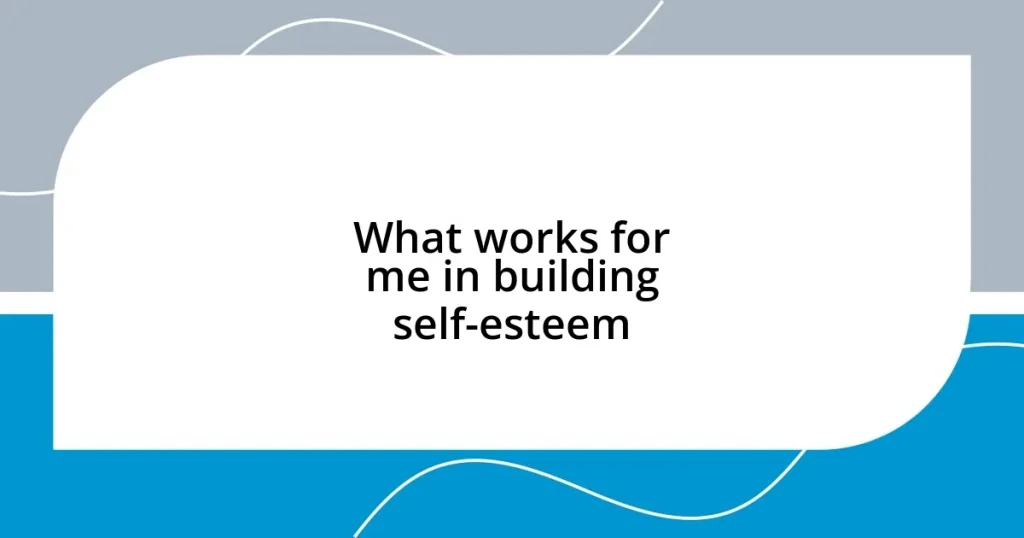Key takeaways:
- Self-esteem is shaped by personal experiences, external feedback, and the way we internalize setbacks or successes.
- Identifying personal strengths and reflecting on past achievements can significantly boost self-esteem and self-awareness.
- Setting achievable goals and tracking progress helps build confidence and reinforces a sense of accomplishment.
- Creating a supportive environment and practicing self-compassion techniques, such as positive self-talk and gratitude, fosters a healthier self-image.
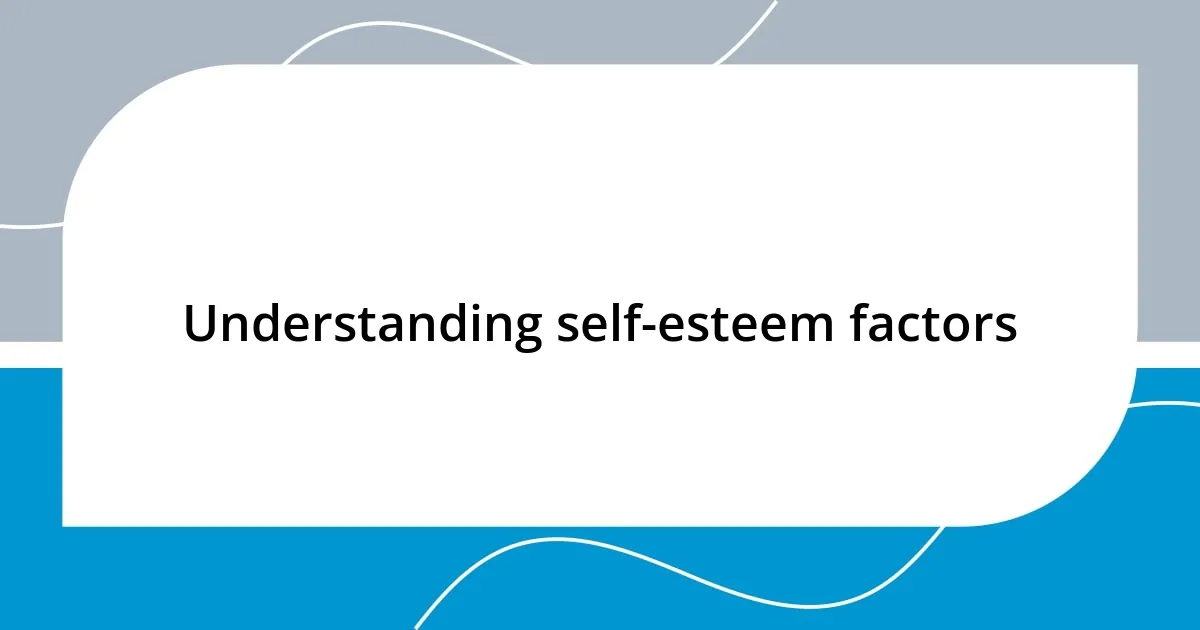
Understanding self-esteem factors
Self-esteem is influenced by a variety of factors, such as our upbringing, experiences, and social interactions. For instance, I recall feeling bolstered or shattered by the feedback I received from my parents. Their words often shaped how I saw myself; can you relate to how someone else’s opinion impacted your confidence?
As I navigated through school, the need for peer validation became apparent. I often found myself caught in the cycle of comparing my achievements with those of my classmates. I remember feeling elated for a moment after receiving praise, but it was fleeting. Why do we tie our worth to external achievements and opinions, and how can we shift that narrative in our own lives?
Personal experiences play a vital role too. I learned that setbacks, like a failed project or a lost opportunity, can either erode or strengthen self-esteem, depending on how we internalize those experiences. I now ask myself, “Am I viewing failures as stepping stones for growth or as a reflection of my worth?” This shift in perspective has been crucial for me, and it might help you too as you explore the landscape of your own self-esteem.
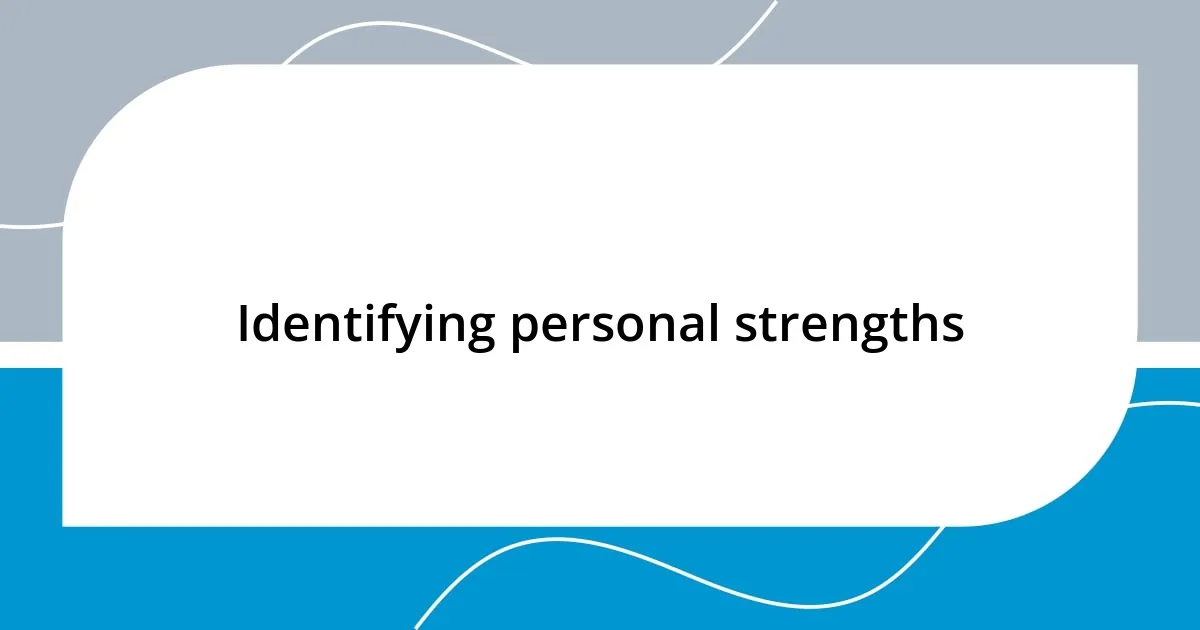
Identifying personal strengths
Identifying our personal strengths can be a transformative process. I remember sitting down one day and making a list of things I was good at—whether big or small. It surprised me to see how many strengths I had overlooked. This simple exercise helped me recognize abilities I previously took for granted, like my knack for organizing events, which ultimately boosted my self-esteem.
Taking the time to solicit feedback from trusted friends can be eye-opening. One of my friends once pointed out my talent for listening and empathizing with others. I hadn’t realized how much that skill meant to those around me until they highlighted it. This not only reinforced the value of my strength but also opened my eyes to other aspects of myself that warranted recognition.
Often, reflecting on past successes serves as a powerful reminder of our capabilities. I recall a time I led a volunteer project, and the positive impact it had on our community left a lasting impression on me. When I revisit that experience, it reinforces my belief in my leadership skills. These moments of reflection are crucial in recognizing what truly makes us shine.
| Strength | Personal Example |
|---|---|
| Listening | Friends mentioned how they felt heard and supported by me during tough times. |
| Organization | Successfully planned a community fundraising event, which turned out to be a hit. |
| Leadership | Led a volunteer team that made a significant difference in local outreach. |
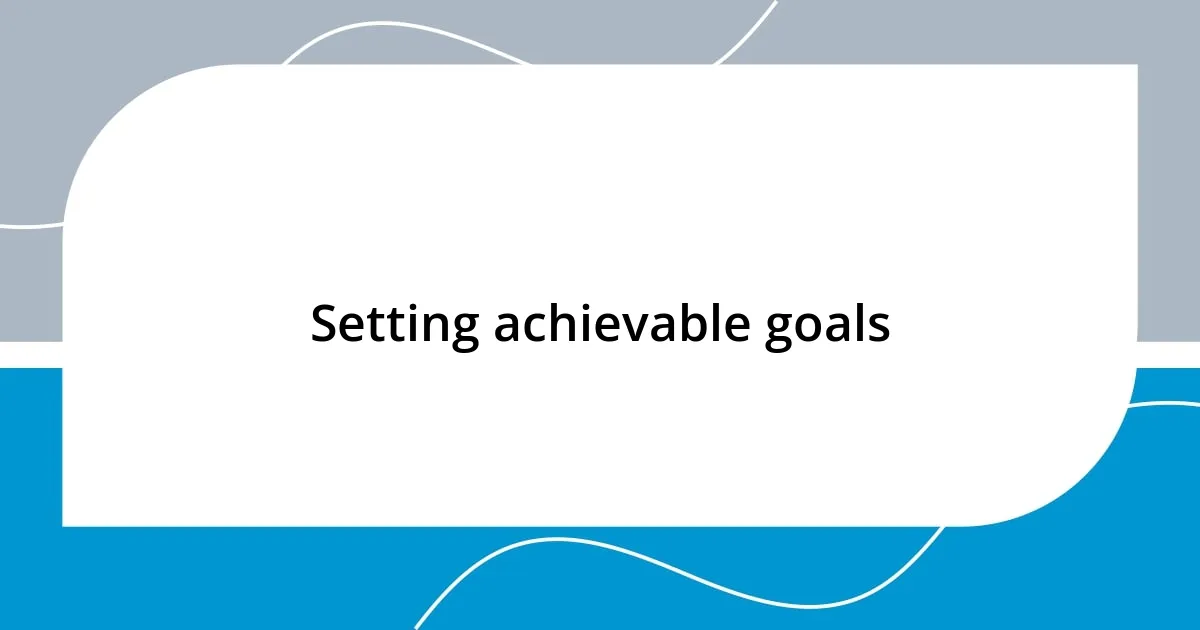
Setting achievable goals
Setting achievable goals
Setting achievable goals is essential for nurturing self-esteem. I’ve often found that when my goals are realistic and attainable, I feel a sense of accomplishment that fuels my confidence. Recently, I decided to break down a larger ambition—running a half marathon—into smaller, manageable steps. I started with a simple goal of running just a mile without stopping. Each small success motivated me to keep going, gradually building my self-esteem along the way.
- Start small: Focus on what you can realistically accomplish in the short term, like dedicating 10 minutes a day to a new hobby.
- Track your progress: Keeping a journal of achievements, even minor ones, can create a tangible record of success.
- Celebrate milestones: Acknowledge your accomplishments, no matter how small. Treat yourself to something nice after reaching your goal.
When I set out to learn a new language, I established a reachable target of learning just five new words a day. Initially, it felt overwhelming, but when I hit that mark consistently, I began seeing my knowledge expand exponentially. I could feel the rush of pride each time I successfully used one of my new words in conversation. It reinforced the idea that every small step leads to growth, progressively enhancing my self-worth.
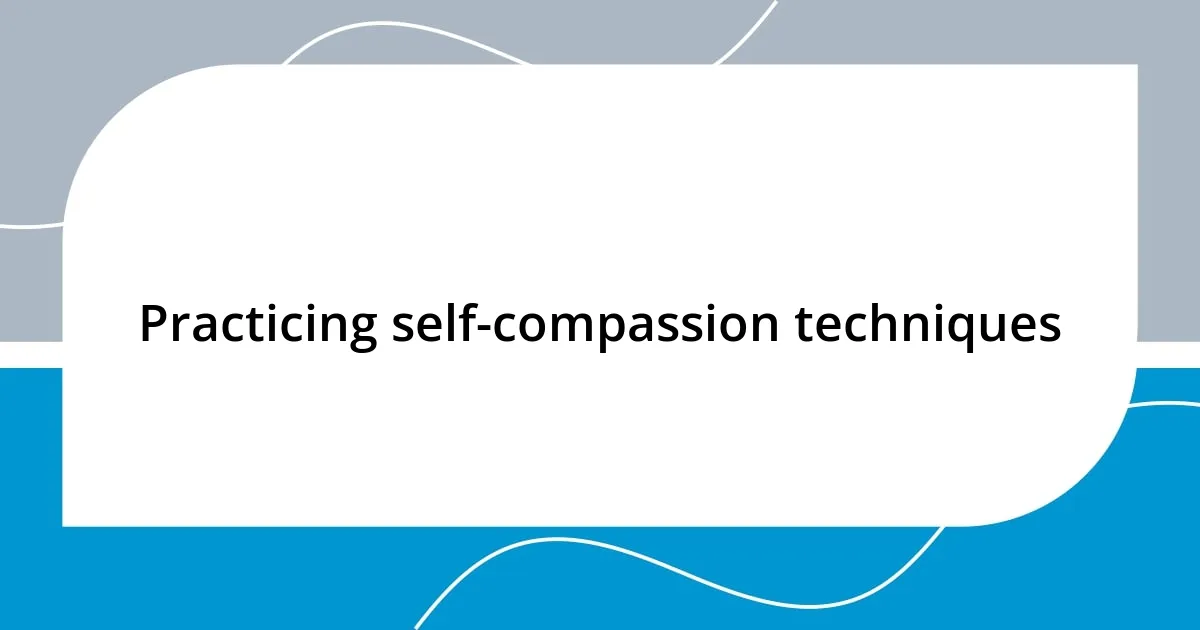
Practicing self-compassion techniques
Practicing self-compassion techniques truly transformed my approach to self-esteem. One method that resonated with me is using positive self-talk. Whenever I catch myself spiraling into negative thoughts, I pause and consciously replace them with affirmations. For example, instead of berating myself for making a mistake, I remind myself that it’s okay to be imperfect. This simple shift in mindset has helped me treat myself with kindness, allowing my self-esteem to flourish.
Another powerful technique is writing a self-compassion letter. I once took the time to write a letter to myself during a particularly challenging week. I poured out my feelings, acknowledging my struggles without judgment. It was cathartic to express my emotions and, most importantly, to reassure myself that it’s acceptable to feel vulnerable. This practice not only elevated my self-worth but also created a space for healing, almost like giving myself a warm hug from the inside.
Mindfulness meditation has also played a significant role in my journey. I remember sitting quietly for just a few minutes each day, focusing on my breath and allowing emotions to surface without criticism. It taught me to accept my feelings as they are, and in doing so, I realized that self-compassion is about recognizing our shared humanity. While I sit there in silence, I often reflect: “What would I say to a friend in my position?” The answers always lead me back to kindness and understanding, reinforcing my self-esteem in profound ways.
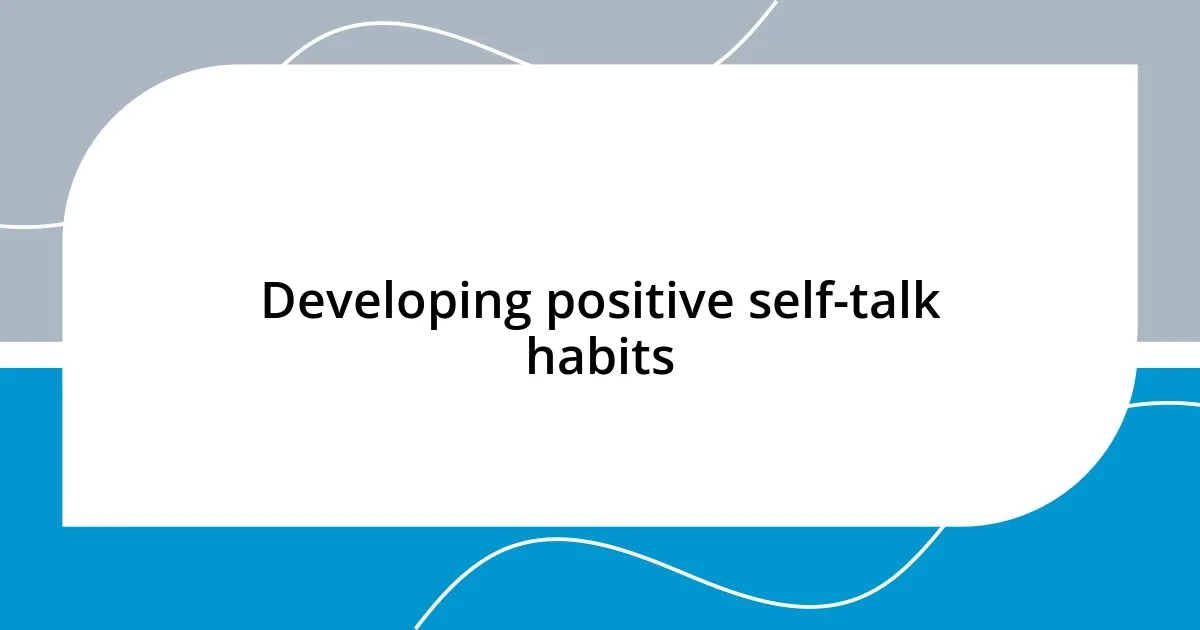
Developing positive self-talk habits
I found that developing positive self-talk habits requires consistent practice and introspection. One technique that worked for me was using a mirror. Every morning, I would look myself in the eye and list three things I liked about myself, from my work ethic to my sense of humor. At first, it felt awkward, and I even chuckled at how silly I thought it was. But as the days turned into weeks, I noticed I approached challenges with more confidence. Isn’t it fascinating how something as simple as a few kind words to yourself can shift your entire day?
Another habit that truly resonated with me is the practice of gratitude. When I started jotting down three things I appreciated about myself every evening, it became like a gentle reminder of my worth. I remember one night writing, “I handled that difficult conversation well.” It was eye-opening to see how often I overlooked my own achievements! Reflecting on these moments helped me cultivate a more positive inner dialogue. Have you ever tried tracking your strengths? It’s remarkable how it can reshape your perception.
Lastly, I learned the power of spontaneous affirmations. Whenever I felt doubts creeping in—like during a challenging work project or a tough workout—I’d pause and chant something uplifting. “I am capable; I can do this!” It sounds a bit cheesy, but I realized how much impact these little mantras had on my mindset. I even started telling friends about my affirmations, and we’d encourage each other to do it too. Who wouldn’t want a little cheerleading squad for their self-esteem journey?
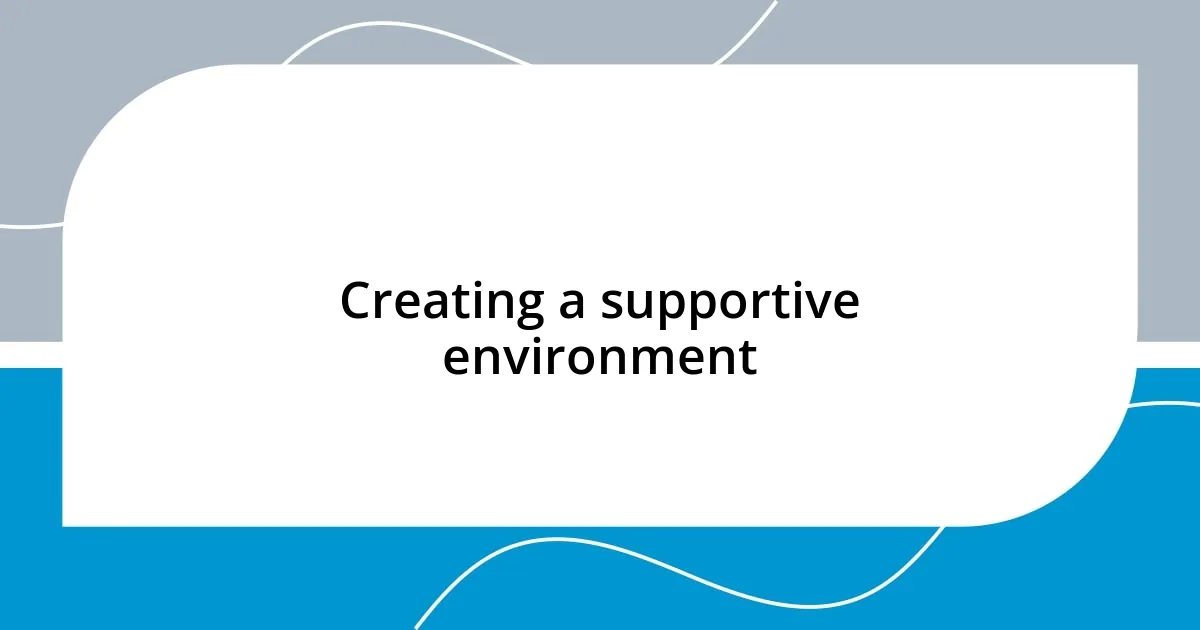
Creating a supportive environment
Creating a nurturing atmosphere around me has been an essential part of boosting my self-esteem. I remember a time when I was feeling particularly low; I reached out to a close friend who always seemed to uplift me. We spent hours talking about our dreams and challenges in a cozy café, and I realized how valuable it is to have people in your life who not only listen but genuinely encourage you. Have you ever noticed how a single supportive conversation can reset your mindset for the entire week?
Cultivating a supportive environment doesn’t just happen; it requires intention. I decided to surround myself with positivity by decluttering my social media feeds. I unfollowed accounts that triggered feelings of inadequacy and focused on those that inspired me instead. It was eye-opening to see how simply adjusting what I consumed daily helped create a more supportive online space. What about you? Have you taken a moment to evaluate your own digital surroundings?
Moreover, I’ve found that creating supportive habits in my daily life significantly improves my self-esteem. For instance, I began hosting weekly gatherings with friends where we share our recent wins, no matter how small. It’s a ritual that reminds us all of our accomplishments and fosters an uplifting environment. I cherish those evenings filled with laughter and positivity, and I often leave feeling recharged. Isn’t it remarkable how community and encouragement can lift us up together?
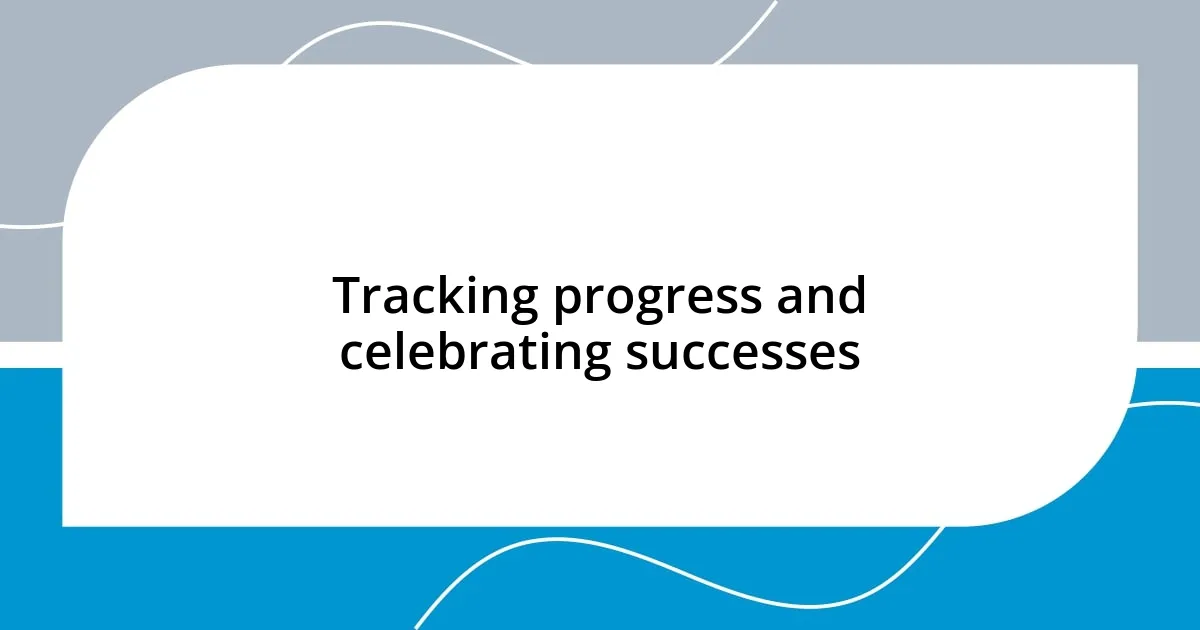
Tracking progress and celebrating successes
The journey of tracking progress and celebrating successes has been transformative for me. I remember creating a simple chart where I could mark my achievements daily. Each time I filled in a box, it felt like a small victory worth savoring. It’s amazing how those tiny acknowledgments can add up to a sense of accomplishment over time. Have you ever noticed how progress, no matter how small, can lift your spirits?
One technique that stood out was keeping a “success journal.” Writing down my wins—whether big or small—became a cathartic experience. I can recall one entry where I noted completing a challenging project at work. Reflecting on that moment reminded me of my capability and reinforced my sense of self-worth. I often ask myself: wouldn’t it be great if everyone took time to cherish their wins in a similar way?
Celebrating successes can also take on many forms. I’ve had nights where I treat myself to a favorite meal or a special movie after achieving a goal. These little personal celebrations signal to my mind that I’m worthy of joy. The key is to make these moments meaningful. How do you celebrate your own milestones? By recognizing and honoring our progress, I’ve discovered that self-esteem isn’t just about what I accomplish; it’s also about honoring the journey along the way.











